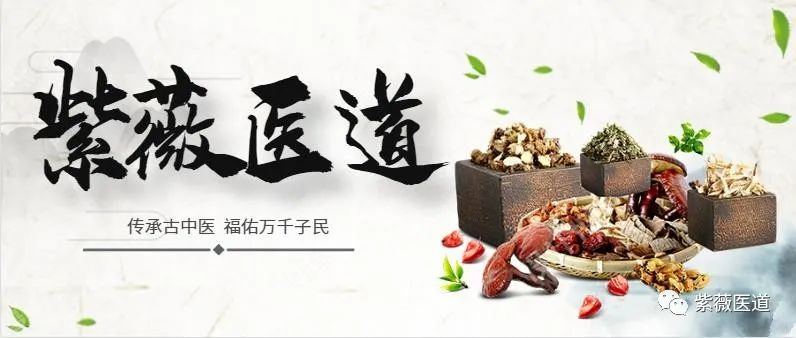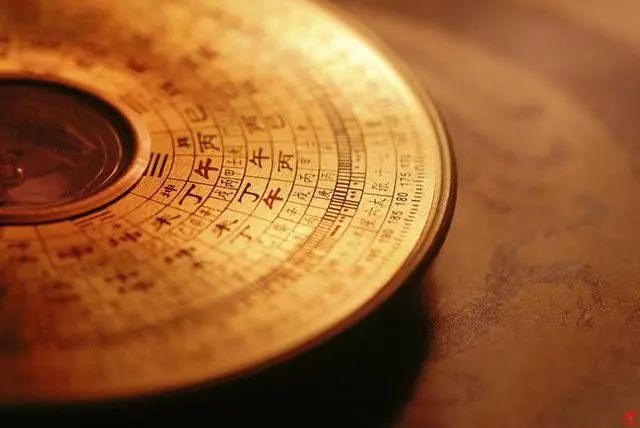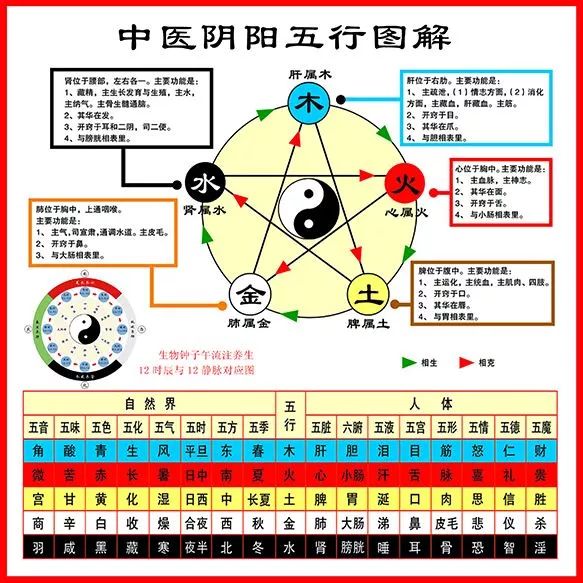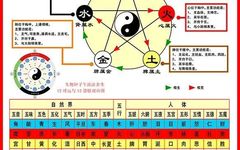
 Celestial Phenomena
Celestial Phenomena

|
Five Elements |
Mu (Wood) |
Huo (Fire) |
Tu (Earth) |
Jin (Metal) |
Shui (Water) |
|
Five Stars |
Muxing (Jupiter) |
Huoxing (Mars) |
Tuxing (Saturn) |
Jinxing (Venus) |
Shuixing (Mercury) |
|
Five Directions |
Dong (East) |
Nan (South) |
Zhong (Center) |
Xi (West) |
Bei (North) |
|
Five Spirits |
Qinglong (Azure Dragon) |
Zhuque (Vermilion Bird) |
Qilin (Unicorn) |
Baihu (White Tiger) |
Xuanwu (Black Tortoise) |
|
Five Seasons |
Chun (Spring) |
Xia (Summer) |
Changxia (Late Summer) |
Qiu (Autumn) |
Dong (Winter) |
|
Six Qi |
Feng (Wind) |
Re, Huo (Heat, Fire) |
Shi (Dampness) |
Zao (Dryness) |
Han (Cold) |
|
Five Promotions |
Sheng (Birth) |
Chang (Growth) |
Hua (Transformation) |
Shou (Harvest) |
Cang (Storage) |
|
Five Times |
Ri Dan (Dawn) |
Ri Zhong (Noon) |
Ri Xi (Dusk) |
Ri Ru (Night) |
Wu Ye (Midnight) |
|
Bagua |
Zhen (Thunder) |
Xun (Wind) |
Li (Fire) |
Kun (Earth) |
Guan (Mountain) |
|
Tian Gan (Heavenly Stems) |
Jia (Wood) |
Yi (Wood) |
Bing (Fire) |
Ding (Fire) |
Wu (Earth) |
|
Di Zhi (Earthly Branches) |
Yin (Tiger) |
Yin (Rabbit) |
Chen (Dragon) |
Si (Snake) |
Wu (Horse) |
|
Five Colors |
Qing (Green) |
Chi (Red) |
Huang (Yellow) |
Bai (White) |
Hei (Black) |
|
Five Tastes |
Suan (Sour) |
Ku (Bitter) |
Gan (Sweet) |
Xing (Spicy) |
Xian (Salty) |
|
Five Organs |
Gan (Liver) |
Xin (Heart) |
Pi (Spleen) |
Fei (Lung) |
Shen (Kidney) |
|
Five Bowels |
Dan (Gallbladder) |
Xiao Chang (Small Intestine) |
Wei (Stomach) |
Da Chang (Large Intestine) |
Pang Guang (Bladder) |
Human Phenomena
|
Five Organs |
Gan (Liver) |
Xin (Heart) |
Pi (Spleen) |
Fei (Lung) |
Shen (Kidney) |
|
Five Bowels |
Dan (Gallbladder) |
Xiao Chang (Small Intestine) |
Wei (Stomach) |
Da Chang (Large Intestine) |
Pang Guang (Bladder) |
|
Five Emotions |
Nu (Anger) |
Xi (Joy) |
Si (Thought) |
You (Worry, Sadness) |
Qing (Fear, Shock) |
|
Five Fluids |
Lei (Tears) |
Han (Sweat) |
Xian (Saliva) |
Ti (Nasal Mucus) |
Tuo (Saliva) |
Yellow Emperor’s Inner Canon Five Elements Summary Table
|
Five Organs |
Gan (Liver) |
Xin (Heart) |
Pi (Spleen) |
Fei (Lung) |
Shen (Kidney) |
|
Five Organs’ Functions |
Jiang Jun’s Function (General’s Function) Strategic Thinking Arises Here |
Jun Zhu’s Function (Ruler’s Function) Divine Insight Arises Here |
Cang Lin’s Function (Storehouse’s Function) Five Tastes Arise Here |
Xiang Fu’s Function (Adviser’s Function) Regulation Arises Here |
Zuo Qiang’s Function (Strength’s Function) Skill Arises Here |
|
Five Spirits |
Hun (Soul) |
Shen (Spirit) |
Yi (Intention) |
Po (Corporeal Soul) |
Zhi (Will) |
Five Elements System
Five Elements: Mu (Wood), Huo (Fire), Tu (Earth), Jin (Metal), Shui (Water);
Five Numbers: 8, 7, 5, 9, 6;
Five Directions: Dong (East), Nan (South), Zhong (Center), Xi (West), Bei (North);
Five Seasons: Chun (Spring), Xia (Summer), Changxia (Late Summer), Qiu (Autumn), Dong (Winter);
Five Qi: Feng (Wind), Shu (Heat), Shi (Dampness), Zao (Dryness), Han (Cold);
Five Colors: Qing (Green), Chi (Red), Huang (Yellow), Bai (White), Hei (Black);
Five Sounds: Jiao (Horn), Zheng (Chime), Gong (Palace), Shang (Merchant), Yu (Feather);
Five Tastes: Suan (Sour), Ku (Bitter), Gan (Sweet), Xing (Spicy), Xian (Salty);
Five Grains: Mai (Wheat), Shu (Millet), Ji (Job’s Tears), Dao (Rice), Dou (Beans);
Five Animals: Ji (Chicken), Yang (Sheep), Ni (Cow), Ma (Horse), Zhi (Pig);
Five Organs: Gan (Liver), Xin (Heart), P (Spleen), Fei (Lung), Shen (Kidney);
Five Bowels: Dan (Gallbladder), Xiao Chang (Small Intestine), Wei (Stomach), Da Chang (Large Intestine), Pang Guang (Bladder);
Five Spirits: Hun (Soul), Shen (Spirit), Yi (Intention), Po (Corporeal Soul), Zhi (Will);
Five Fluids: Lei (Tears), Han (Sweat), Xian (Saliva), Ti (Nasal Mucus), Tuo (Saliva);
Five Bodies: Jin (Tendons), Mai (Veins), Rou (Flesh), Pi (Skin), Gu (Bone);
Five Sounds: Hu (Call), Xiao (Laugh), Ge (Sing), Ku (Cry), Shen (Moan);
Five Emotions: Nu (Anger), Xi (Joy), Si (Thought), You (Worry), Qing (Fear);
Five Poisons: Nu (Anger), Hen (Hatred), Yuan (Resentment), Nao (Irritation), Fan (Anxiety);

